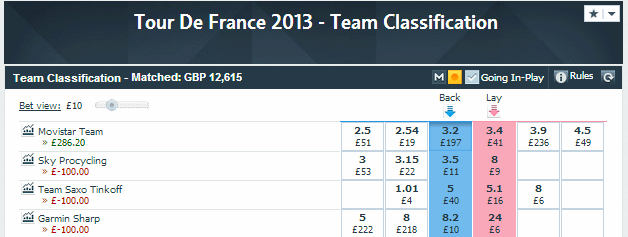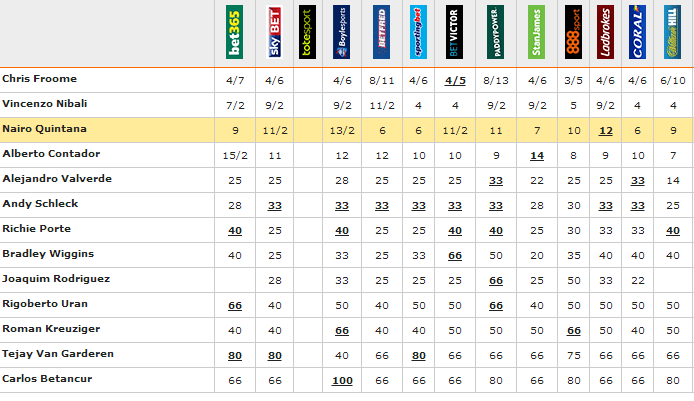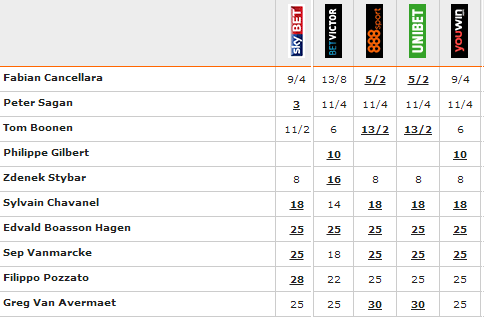- Details
- Published on Monday, 06 January 2014 13:16
The Basics of Betting on Cycling - Part II
Betting with the Betting Exchanges
Betting exchanges have been around for over a decade now and if you do not have an account with an exchange then you are really missing a major weapon in your betting arsenal for betting on cycling!
There are two main betting exchanges, Betfair, who dominate the market and their smaller rival Betdaq, who were recently acquired by Ladbrokes.
Betting exchanges are a peer-to-peer betting exchange – this means that the prices and bet you see on screen are put there by other punters like you or me. The key difference with betting on cycling using a betting exchange is the ability to ‘lay’ a bet as well as back like you would do with a normal bookmaker.
There are two options on every price you see on an exchange. For example, on Betfair, when you look at the prices for the winner of a race you will see two columns of prices in blue and pink. If you fancy Movistar to win the Team Prize at the Tour you can click the blue box and take the price that is up there - 3.2. If you don't think Movistar will win the Team Prize you can 'Lay' them at 3.4 by clicking on the pink column - more on laying later.
Here you can also see the second main difference between a bookmaker and an exchange – price are displayed as ‘decimal’ odds. 3.2 in this instance is 2.2 to 1 or the equivalent of almost 9/4 with a bookmaker. As you get your stake returned with your bet, the 3.2 is the total return. Take 1 away from the price you see to get the odds on your bet. Similarly, if you see a price like 1.5, this is the equivalent of 1/2 – any price below 2.0 is ‘odds on’.
So getting back to your bet on Movistar – if you click on 3.2 you are backing Movistar to win the stage at 2.2/1. If you had say £10 on Movistar to win, your return will be £22. What you actually get back though will be a little less, as the exchanges take a small commission on the net winnings, this is how they make their revenue. The key thing with betting on exchanges though from a betting point of view is that as it is other individuals that are putting the prices up to back and lay, the prices are almost always better than the price you are getting at a bookmaker as their prices include their 'over-round' or profit margin. Sometimes there is a huge difference, especially on outsiders. When I backed Daniel Martin to win the stage of the Tour de France this year, I got 55/1, he was just 40/1 with the best priced bookmaker. Generally, this additional return from the greater odds on the bet will more than outweigh the exchanges commission.
I’ve mentioned ‘laying’ and ‘lay bets’ put up by other punters. As I said above, the key difference and one of the great features of a betting exchange is the ability to place a lay bet like a bookmaker would – you can effectively become a bookmaker. If you don’t think that Movistar will win the stage or even that you think their price is just too short at 3.4, then you can place a lay bet on them at say 3.25 or 3.3 to try to encourage someone to take your bet. To lay a bet for £10 at 3.3 though you will have to put up enough money to cover your potential liabilities – as you are offering 2.3 to 1 to someone you will need to pay the other party £23 should Movistar actually win the stage. If they do not win the stage you get to keep the backers £10 like a bookmaker would. Think of it as if you were having a bet with a friend with Betfair holding the money and settling up between you once the result is known.
This can be a great way to turn your knowledge and beliefs on how a rider will fare in to a profit if you believe their price is too short or if you think they will not win a stage (or the green jersey, or the overall GC, or finish in the Top 3 etc). For example, I thought Bradley Wiggins was far too short around 5/4 to win the Giro D’Italia in May and laid him at 2.26 – if I had layed say £50 at 2.26 I would have had to pay out £63 to the backer if Wiggins won (£50 x 1.26) but if he didn’t win I get to keep the backer’s stake of £50 (minus the commission).
With betting exchanges you can also ‘build a book’ as they call it, where you can take back or lay positions against several riders as their prices move around in play. For example, if you had layed Thomas Voeckler for the Mountains Jersey at 3.3 you could have backed him back later in the race at 6 or 8/1 to guarantee a profit regardless, same with laying Pierre Roland at short odds in the last few days of the Tour, adding to your profit as Quintana went on to win it with his victory on the penultimate stage.
Please feel free to add a comment below or send me a tweet @cyclingbetting if you would like to learn more about backing and laying on the betting exchanges, I will be happy to help out.










